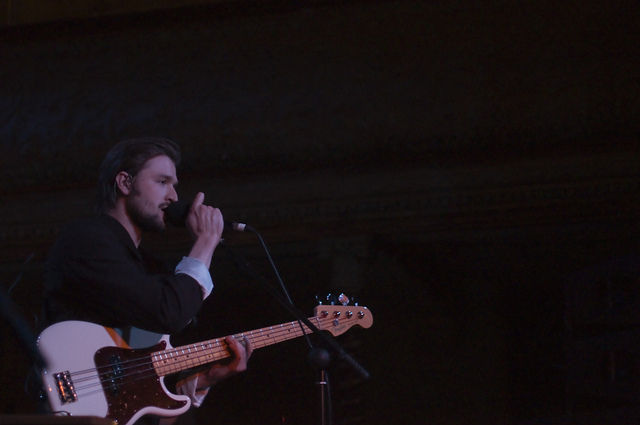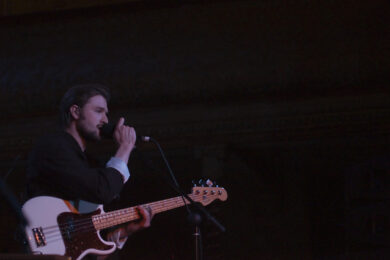It’s a bad time to revel in the alternative. It’s a bad time to demand meaning in culture. Access to credit and other freedoms of the post-industrial West have created surplus leisure time which we now choose to fill with useless cultural artefacts in the name of art. But not everyone is an artist and music is perhaps the guiltiest party of all as band after band toss another album into the void, each digital file or circular piece of plastic a little more meaningless than the last.
Jean Baudrillard said “We are no longer in a state of growth; we are in a state of excess”, an assertion that is plain to see as our ears become clogged up with empty noise made by self-aggrandising whippersnappers we call rock bands, most of who do little more than hold a mirror up to the very recent past, then frame it, sign it and sell it as an original.
There is simply too much music, and the quaint idea of “rock ‘n’ roll” as perpetuated by the all-male “alternative” guitar band is now a near-obsolete format. As was prophesised (by David Quantick in NME, circa 1986), pop has eaten itself. But th young need feeding and the feast must continue. So now it has excreted itself too, scarfed the mess, then done it again, and is forever locked into an onanistic cycle of terminal decline, eating and wanking and puking itself into ever-decreasing globule, its world decreasing, its creative value diminishing. Dirty dog, pop. Dirty dog, indie rock.
Its exponents have many names – ‘The Strokes’, ‘Beady Eye’, ‘The Wombats’, ‘White Lies’ – and they congregate at festivals organised by communications companies. Their ugly swine faces and regurgitated ideas continue to find favour, such is each new generation’s appetite for the signs and signifiers of recycled sounds that a revisionist music press tells them were so much better before they were born. The increased velocity at which the dizzying cyclical nature of music means that by the time you’re 21 you think you’ve heard it all before. Culture is accelerating beyond control, impossible to keep up with and therefore forces new consumers to take a stand: do you commit to the future or do you run scuttling back to the safety of the familiar?
The familiar is where youth goes to die. Up against, say, the sub-Saharan loops and hollers of one-woman band Tune-Yards or the raw, gut-punching rhymes of Odd Future – the music of now – the bands with their Northern helmet hair and chips on their shoulders remain relics, parodies of that which once was. Indie rock isn’t dead of course, it’s very much alive, in the way that steam rallies or burlesque or Northern Soul are alive. It’s a period piece, nostalgia for the second half of the twentieth century. Alternative is Peter Hook releasing new Joy Division songs or Primal Scream playing Screamadelica to yummy mummies high on the ecstasy of child-rearing.
Indie rock ate itself. And you are feasting on its shit, people. But something as nebulous as ‘rock’ doesn’t become obsolete overnight as a physical object such as a Betamax or a pager would. Occasional bursts of unique noise still resonates on through. Wild Beasts are one of the few beams in the darkness, as intellectually and stylistically removed from the hetero-rock milieu as can be. It’s a fact so glaringly obvious when they take to the stage tonight just three hours before the release of third album Smother.
Wild Beasts matter because they are the antithesis of the indie rock shit/vomit machine, and offer an actual alternative to ‘alternative’. Yes, they are four young Northern men with guitars but their music is graceful, restrained, delicate, feminine, fragile, complex, literate, poetic, polite. Their closest musical allies – Kate Bush, Tal Talk, The Associates – are not that close at all, and peaked around about the time the members of Wild Beasts were born.
Wild Beasts have confessed to being inspired by The Strokes, but they have had the sense to flee far away from such start points, their sound glancing only very slightly towards the pulsing rhythms of house and the ambient end of dance music, or maybe the sounds found on stereos post-rave, as well as the spaciousness and bass reverberations of dub and the sexual throb of it digitised offspring, dubstep. It’s heart music. All the way.
Much gets rightly written about the duel falsetto of singers Hayden Thorpe and Tom Fleming, two honeyed voices full of lascivious intent, but equally as unique are the fluttering and hypnotic drum patterns of Chris Talbot, which drive Wild Beasts forward into a unique soundscape. It’s a style reminiscent of Can’s Jaki Liebezeit, whose metronomic rhythms similarly acted like hypnotist’s pocket watch swinging before your eyes, tapping out rhythms that fall into sync with your heart beat.
Rhythms that continue long after the song has stopped and are capable of carrying you all the way home. On their 2009 second album Two Dancers, Wild Beasts painted the pissed-up street scenes of Anytown, Britain as something beautiful and balletic, a world where violence and sex were intertwined, and the thugs were the articulate sons of A Clockwork Orange’s Little Alex. Morrissey must have been spitting with envy.
Today, it’s a more tempered creature that has created Smother – Mild Beasts, if you like – but the result is equally as beguiling. The new songs are a challenge to listeners, which is just as it should be, delivered from a console of keyboards and aided by bleeps and buttons and the addition of a keyboardist.
The pulse beat opera of ‘Lion’s Share’, the ambient throb of ‘Loop The Loop’ or opener ‘Plaything’, whose bottom end rattles the fittings like a dubstep song, all serve to plunge those in attendance into a mesmerist’s state and seem to silence even the most vocal gobshites by the bar. Tonight is a hometown show of sorts – Wild Beasts are Kendal-born, Leeds-shaped and now London-based – and their second performance of the day, so has the feel of both the end and the beginning of something. Leeds won’t witness Wild Beasts in a venue this small again.
The spell that they cast is only broken when they play familiar songs: the clockwork-sounding soul of ‘Devil’s Crayon’, the shimmering choral stomp of ‘All The King’s Men’. Ever heard four hundred yelping “Hatch me! Hatch me!” in unison? It’s fucking weird. And it’s not like anything that has gone before.
Which brings us back to the beginning and the idea that indie rock is an empty husk, a burnt stump, and now only exists in what Baudrillard (him again) termed in his 1983 essay Simulacra and Simulations the ‘desert of the real’, where culture has moved away from representation (of something real) to become a simulation of something that is now untethered from any reference to its reality, and has therefore lost meaning. Rock & roll is meaningless, it is a photocopy of a photocopy of a photocopy.
Yet out of this desert will emerge some brave new souls, new bands, new sounds. Some may even offer genuine alternatives. Wild Beasts are one of them.



